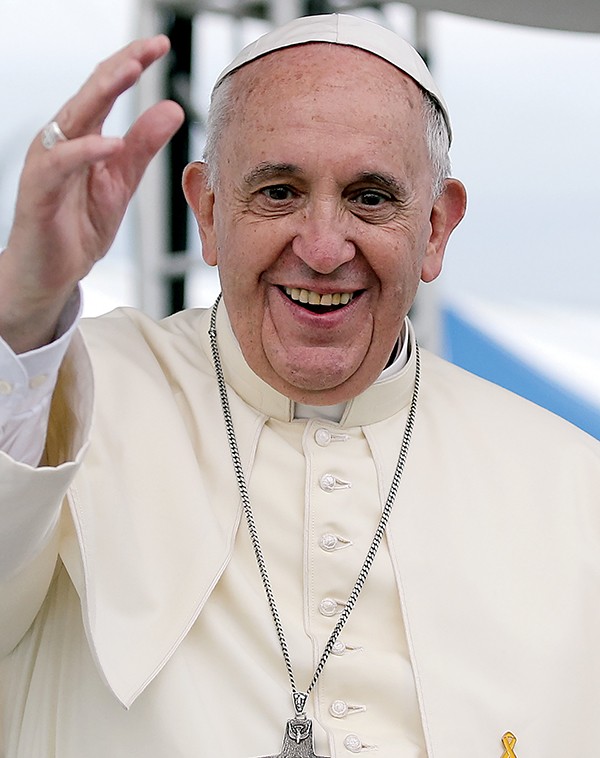So the pedophile ring wasn’t in a Washington, D.C., pizza parlor basement. It was in a Catholic church. Shocker.
It’s always hard to write about the Catholic Church’s ongoing and ever-resurfacing problems with priests who molest young people in their charge. I have many good friends who are Catholic, and I would never disparage their religious beliefs nor doubt their commitment to living a good and moral life.
That said, this issue of sexually inappropriate behavior by Catholic priests never really goes away. It’s been with the church for centuries — a simmering, permanent crisis that boils into public consciousness with metronomic regularity.
 Wikipedia | Jeon Han
Wikipedia | Jeon Han
In recent months, Catholic authorities have launched investigations into sexual misconduct in parishes in Philadelphia, Boston, Nebraska, Washington, D.C., Australia — and has accepted the resignations of six South American bishops. All of these troubling stories are bad enough, but the grand jury report released last week in Pennsylvania takes the church’s recurring scandal to revolting new depths.
The 900-page report reveals that, over the course of 70 years, 300 “predator priests” in six Pennsylvania dioceses molested, abused, and raped more than 1,000 children. That’s 1,000 children. In one state.
The report details how church leaders and bishops covered up the crimes, concealing them from the children’s parents and law-enforcement authorities, and routinely transferring predator priests to unsuspecting parishes where they could re-enact their crimes. One section of the report describes a ring of pedophile priests who marked their child victims with the sign of the crucifix.
This is horror movie stuff. And amplifying the horror is the fact that we know pedophilia causes life-long psychological trauma to its victims — and creates more pedophiles, and more victims. It is, literally, a vicious cycle of pain, anger, and guilt.
Only two priests of the 300 cited in the grand jury report suffered consequences for their actions. The rest either died, the statute of limitations expired, or they were allowed to quietly resign or retire. It’s outrageous, but it’s not surprising. It’s been the church’s response to these things for centuries: Keep it quiet and hope it goes away.
But it won’t; it’s sex-abuser Whack-A-Mole. The church can’t keep up, and it’s too big to change its basic operating structure.
In essence, the Catholic church is an international organization worth billions of dollars — in real estate holdings and with a steady income stream of contributions from its parishioners around the globe. Its hierarchal structure is similar to that of a huge, multinational corporation. For want of a better term, the church’s principal “employees” are its priests, nuns, bishops, and cardinals. When those higher up the corporate food-chain — the bishops, primarily — cover up the sins of their underlings, it creates a corporate culture of permissiveness, an understanding that criminal behavior will be tolerated in order to spare the organization’s reputation. And too often, the bishops themselves have participated in the deviant behavior.
The current Catholic leader, Pope Francis, has been a breath of fresh air, for the most part, and seems to recognize that there are significant flaws in the very structure of his church that interfere with its proscribed goal: to encourage adherents to live a life based upon the teachings of Jesus Christ. But that’s hard to do when some of your employees are doing the devil’s work — creating hell for thousands of young people — and when their bosses are letting them get away with it.
The pope issued a scathing statement this week, condemning the “crime” of priestly sexual abuse and its cover-up. He asked for forgiveness from the victims and urged Catholics to get involved to help abolish the pattern of abuse and cover-up.
“With shame and repentance,” he wrote, “we acknowledge as an ecclesial community that we were not where we should have been, that we did not act in a timely manner, realizing the magnitude and the gravity of the damage done to so many lives. We showed no care for the little ones; we abandoned them.”
Strong words. I’d like to believe they will lead to change, but I’m not optimistic. As long as the church requires its priests and nuns to remain celibate, it will continue to create — and sustain — a culture of sexual repression. Enforced celibacy doesn’t take people closer to God. It makes people more susceptible to guilt and temptation — and deviance of the ugliest kind.